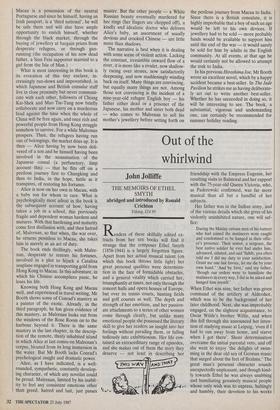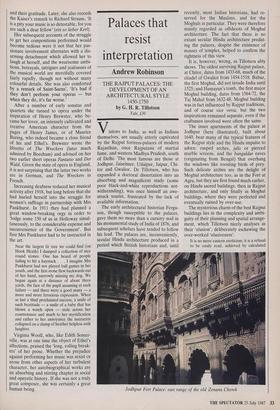Out of the whirlwind
John Jolliffe
THE MEMOIRS OF ETHEL SMYTH abridged and introduced by Ronald Crichton
Viking, f14.95
Readers of these skilfully edited ex- tracts from her ten books will find it strange that the composer Ethel Smyth (1858-1944) is a largely forgotten figure. Apart from her actual musical talent (on which this book throws little light) her great personal qualities were determina- tion in the face of formidable obstacles, and a general vitality which carried her, triumphantly at times, not only through the concert halls and opera houses of Europe, but over its tennis courts, hunting fields and golf courses as well. The depth and strength of her emotions, and her passion- ate attachments to a series of other women come through clearly, but unlike many emotional people she possessed the literary skill to give her readers an insight into her feelings without parading them, or falling tediously into exhibitionism. Her life con- tained an extraordinary range of episodes, and she makes out of them the story they deserve — not least in describing her friendship with the Empress Eugenie, her resulting visits to Balmoral and her rapport with the 75-year-old Queen Victoria, who, as Paderewski confirmed, was far more musical than all but a handful of her subjects.
Her father was in the Indian army, and of the various details which she gives of his violently uninhibited nature, one will suf- fice:
During the Mutiny certain men of his battery who had joined the mutineers were caught and condemned to be hanged in their offic- er's presence. Their senior, a sergeant, the best native soldier he ever had under him, advanced, saluted, and said 'Sahib, you often told me I did my duty to your satisfaction. Grant me one last favour, let me die by your own hand.' And by Jove,' said my father, `though our orders were to humiliate the mutineers in every way, I did as he asked and hanged him myself.'
When Ethel was nine, her father was given command of the artillery at Aldershot, which was to be the background of her later childhood. Next, she was improbably engaged, on the slightest acquaintance, to Oscar Wilde's brother Willie, and when this fell through she announced her inten- tion of studying music at Leipzig, 'even if I had to run away from home, and starve when I got there'. Sheer determination overcame the initial parental veto, and off she went to enjoy 'the delights of swim- ming in the dear old sea of German music that surged about the feet of Brahms.' The great man's personal character sounds unexpectedly unpleasant, and though kind- ly towards Ethel he was always snubbing and humiliating genuinely musical people whose only wish was to express, haltingly and humbly, their devotion to his works and their gratitude. Later, she also records the Kaiser's remark to Richard Strauss, 'It is a pity your music is so detestable, for you are such a dear fellow' (ein so lieber Kent).
Her subsequent accounts of the struggle to get her compositions performed would become tedious were it not that her pas- sionate involvement alternates with a dis- arming detachment which allowed her to laugh at herself, and the wearisome ambi- tions, betrayals, intrigues and jealousies of the musical world are mercifully covered fairly rapidly, though not without many colourful details. She was also comforted by a remark of Saint-Saens', 'It's bad if they don't perform your operas — but when they do, it's far worse.'
After a number of early sonatas and quartets she turned to opera under the inspiration of Henry Brewster, who be- came her lover, an intensely cultivated and creative American character from the pages of Henry James, or of Maurice Baring, who indeed became a close friend of his and Ethel's. Brewster wrote the libretto of The Wreckers (later much admired by Beecham) and advised on her two earlier short operas Fantasio and Der Wald. Given the state of opera in England, it is not surprising that the latter two works are in German, and The Wreckers in French.
Increasing deafness reduced her musical activity after 1918, but long before that she had hurled herself into the struggle for women's suffrage in partnership with Mrs Pankhurst. In 1911 they had planned a great window-breaking orgy in order to `lodge some 150 of us in Holloway simul- taneously, to the considerable expense and inconvenience of the Government'. But first Mrs Pankhurst had to be instructed in the art.
Near the largest fir tree we could find (on Hook Heath) I dumped a collection of nice round stones. One has heard of people failing to hit a haystack . . I imagine Mrs Pankhurst had not played ball games in her youth, and the first stone flew backwards out of her hand, narrowly missing my dog. We began again at a distance of about three yards, the face of the pupil assuming at each failure — and there were a good many — a more and more ferocious expression. When as last a thud proclaimed success, a smile of such beatitude — a smile of a baby that has blown a watch open — stole across her countenance and much to her mystification and rather to her annoyance the instructor collapsed on a clump of heather helpless with laughter.
Virginia Woolf, who, like Edith Somer- ville, was at one time the object of Ethel's affections, praised the 'long, rolling break- ers' of her prose. Whether the prejudice against performing her music was sexist or arose from other aspects of her turbulent character, her autobiographical works are an absorbing and stirring chapter in social and ()peptic history. If she was not a truly great composer, she was certainly a great human being.



















































 Previous page
Previous page